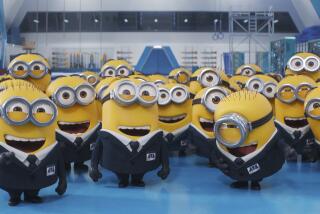Disabled Groups Assail ‘Monkey Shines’ Ads
- Share via
Outraged over Orion Pictures’ newly released “Monkey Shines” and its advertising campaign--which, among other things, depicts a toy monkey in a wheelchair--two organizations of disabled persons plan to stage protests today at the Hollywood Pacific Theater.
Adapt California and Adapting Society are calling on members to join wheelchair picket lines in spite of a peace-seeking meeting held Thursday with Orion Pictures’ chief Mike Medavoy. Medavoy promised to have offending language removed from the “Monkey Shines” print ads, but refused to make a commitment to change the television commercials.
The George Romero chiller centers on a man who is paralyzed and the capuchin monkey that serves as his attendant. The ads raised anger and alarm in the disability community, even before anyone had the chance to view the film, because they thought the same attitude would be reflected in the movie.
“The idea of a monkey attendant turning into a monster is appalling,” said Bill Bolte of Adapt California.
Contacted at his office Friday, Medavoy confirmed that Orion plans to cut offending lines from its print ads and said he’s sure the most hotly criticized part of the “Monkey Shines” commercials--the monkey in a wheelchair--will be excised “as soon as possible.”
Having been through a recent protest over the depictions of gang violence in Orion’s “Colors,” he said, “ ‘Colors’ was the silliest protest I ever heard of. This may have more merit. We probably were insensitive to certain things.”
Alan Toy, who heads the Hollywood-based Media Access Organization that advocates positive images of the handicapped and monitors their depiction in films and TV, said his office has been inundated with calls for action since the “Monkey Shines” ads began appearing two weeks ago.
But he believes the disparaging advertising “was not done out of malice, but out of a lack of information or understanding about the issue.” He cited Orion’s laudable track record of productions that treat handicapped persons with dignity, such as “Dominick and Eugene.”
Toy orchestrated the meeting with Medavoy in hopes of effecting a reconciliation between the film firm and members of the disability community. While he applauded the executive’s “class” in approaching the problem, he admitted that “nobody left completely satisfied.”
In addition to Medavoy and Toy, the group included Darrell Ray and Tari Susan Hartman of Media Access; Dr. Paul Longmore, formerly of USC’s Program in Disability and Society; Barbara Waxman, co-founder of Adapting Society; Tom Ritter of the Corporation on Disabilities in Telecommunications; and Dorik Perman, an uninvited attendee and a man behind today’s planned demonstration.
More to Read
The biggest entertainment stories
Get our big stories about Hollywood, film, television, music, arts, culture and more right in your inbox as soon as they publish.
You may occasionally receive promotional content from the Los Angeles Times.










